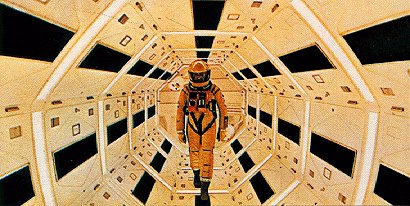
2001: A Space Odyssey
Personal Views inspired by the genius of Arthur C. Clarke:

My Personal Movie Review
I think the movies "2001: A Space Odyssey" and "2010: Odyssey II", by Arthur C. Clarke and Stanley Kubrick, are a vision of our future. It looks like "the popular opinion of the future of mankind circa 1968 and beyond." One beautiful thing about this movie is the cinematography. The first 15 minutes or so of 2001 have no lines of dialogue, so those scenes appeal to our animal instincts more than our social egos. Those scenes also contain powerful visual metaphors, such as the alignment with the sun, moon, and monolith at the dawn of man. When the monolith is discovered on the moon, it is aligned with the Sun and Earth; and when David Bowman warps through the monolith/stargate, Jupiter and it's moons are aligned with the monolith. These scenes are also accompanied by strong auditory stimulation. The senses are bombarded. Arthur C. Clarke is definitely on to something here.What are these metaphors representing?

Reality Check
As far as the HAL 9000 and standardized supertechnology goes, I think the depiction might have been closer to several years beyond 2001. I don't think we will have a foolproof, hands-free type of computer that is basically an artificial intelligence capable of (mimicing) everyday human interaction, in three years. However, I think such a computer could exist before 2020 or so. The computers we have now are quite impressive, but don't stack up to HAL. HAL had soul.
When HAL Exists?
When our buddy HAL 9000 finally comes into existence, and the feats of robotics develop, we will reach the age of androids. What will life be like with androids to do our everyday tasks? Arthur C. Clarke suggested a Utopian world (in another good novel, "Childhood's End") in which anything that could be run by robots or computers was automated. We live in very interesting times. We are in the midst of technical and social revolutions. When the day comes that androids are a reality, we will face many new issues. Would androids be tools, just another extension of man? Or would androids be a new race, worthy of individual respect? Androids could theoretically function forever, but yet we would not consider them alive? At what point should we consider something to be alive? If the android is really intelligent, would it not perfect itself and rid itself of bad human design? If they could, what designs would they create? What if they started building more androids? What will their behavior be? Would they long to be human, like so many movies and TV shows have suggested? Would they admire us, or is that human vanity? Would they hate us? I think we can learn something about ourselves from the "monsters" we create.
What is the monolith?
Ultimately I believe the meaning of the monolith to be in the eye of the beholder. How can this simple rectangle mean so much? Because it isn't a rock. It is ARTIFICIAL. I think the choice of the shape rectangle (as opposed to sphere, a more cosmically natural shape) is a metaphor for its artificiality. It is an extremely intelligent thought which mainfested into reality. There mere concept that such a thing could exist was unfathomable by the apemen. It is an enigma to them. It is the unknown.
What do we know about the monolith? It was not made by a human civilization possessing space technology (due to the monolithic presence in the Jovian Sytem) that we are aware of. It is extraterrestrial in origin. Apparently, the monolith has some kind of physical effect on evolution (thinking patterns). When the ape who dicovers the bone as a weapon recalls the monolith he saw, he begins thinking differently. The monolith is also apparently a stargate (some unknown form of transportation). This stargate aspect could be a metaphor for ascension (personal and/or global).
Thanx.